Crazy Rich Asians: Cosmopolitan Film but Tacky Title
Crazy Rich Asians. The title is tacky, but the actual movie is both heartwarming and cosmopolitan. After all, it takes place in Singapore!
Shadow and Bones is based on the book trilogy of the same name by author Leigh Bardugo, an Israeli-American author. The series was noted for presumably changing protagonist Alina Starkov’s race to half Shu – paralleling actress Jessie Mei Li who is half Chinese half Caucasian. In the books, she was just depicted as a “pale girl”. Showrunner Eric Heisserer and author Bardugo explained the reason for this supposed change “as an intentional way to highlight Alina’s outsider status, without having to over-explain things with dialogue. He figured that racism would be universally recognized, and more visual.” Wow, way to use the race card for storyline context and minimizing exposition. Just kidding. I’m not complaining. In fact, I’m pretty thrilled with the decision. I’m also relieved with the creator’s clear reasoning and articulation. The fact that Alina was played by a half Chinese girl was emotionally powerful for me – and I would guess for many Chinese Americans and Asian Americans – given all the anti-Chinese sentiment that has been so prevalent in the American subconscious and attitude, especially throughout the last year’s global pandemic and rhetoric.
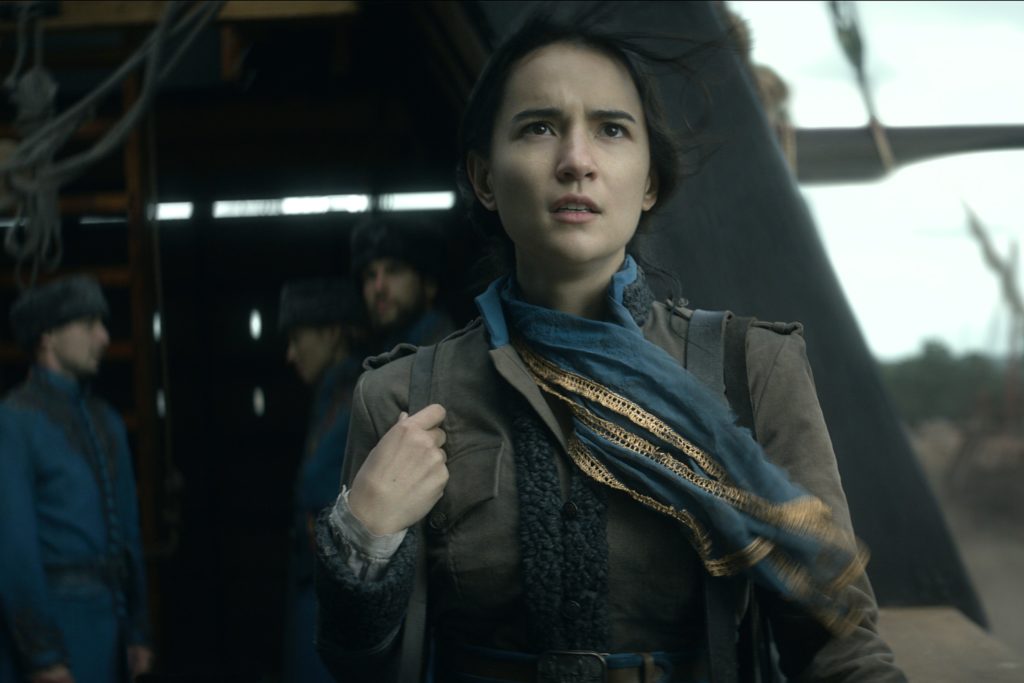
The Netflix preview – that I was shown anyways – featured a strong Black woman who commanded the ship through the Fold. One would assume that she’s the main character. However, she was only in the show for the same duration as she was in the preview, ie about 20 seconds in 8 hours, with roughly 3 lines. I’m sure this deceptive marketing is disappointing for those excited to see strong black female representation, and it is just confusing for everyone else.
Jessie Mei Li stars as Alina Starkov, the feisty cartographer with kindness, innocence, and integrity, who comes to be revealed as the legendary summoner of light. I love this! The show did a pretty good job showing how people can be condescending and flat-out hateful towards others due to race. The actress is half Chinese half Caucasian (English), appropriately paralleling the character who is half Shu (East Asian) half “normal” (white, presumably Russian). Alina was ashamed of being half-Shu throughout the whole season, never proud of it, and there was no indication of anyone in the story seeing the Shu part of her as a positive thing. Instead, it was portrayed as a shameful identity flaw to overlook and overcome. Even her friend and handmaiden Genya said, “I don’t care if you’re half Shu” as if it were her graceful politeness to overlook Alina’s disability. I haven’t read the book series or looked this up for fear of spoilers (related article What Netflix’s Shadow and Bone Gets Right and Wrong With The Books’ Diversity), but I wonder if there will be positive Shu representation in season 2. I guess the showmakers have creative liberty with this given that Alina wasn’t half Shu in the books. Season 2 is likely to see Alina needing to tear down the fold, unless the show is renewed for season 3, matching the length of the book trilogy.
I applaud the show’s creators and costume designers for being wise in giving Alina a modest full-body uniform and outfit for the majority of the story. Asian women are already sometimes despised (by some) and ogled (by others) as being too sexual in films. The fact that Alina had a strong character and a humbly dressed portrayal made her out to be more grounded and relatable to audiences, in my opinion. There was even some humor where Alina herself pokes fun at how stupid it is for her to be wearing a flowery modest veil together with her soldierly modest uniform.
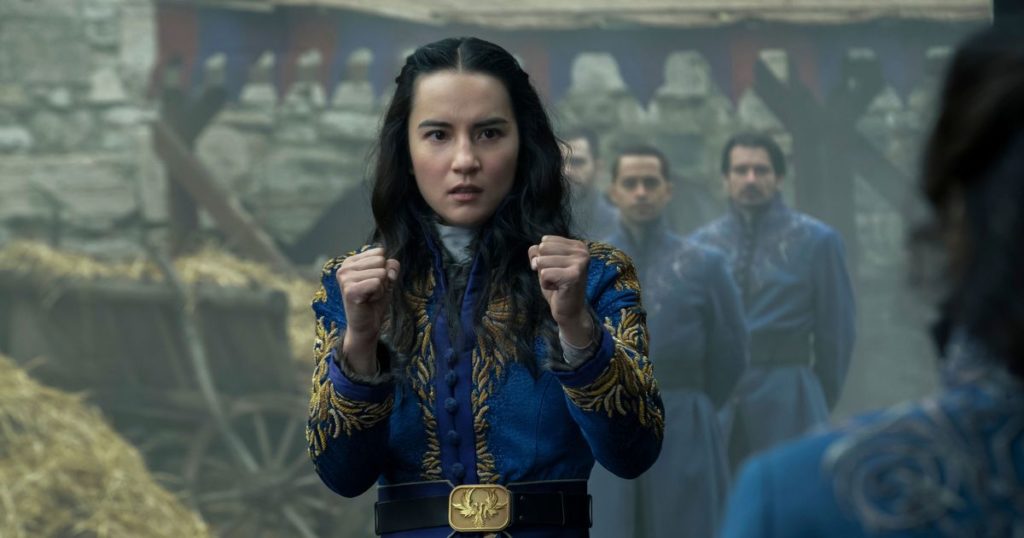
Alina saves Mal about as much as he saves her. I think Alina was the perfect balance of peaceful and feisty throughout most of the show. However, towards episode 7, it was annoying to see her as more “damsely” and helpless, especially when she should’ve known better. I guess her trusting nature and not wanting to see Kirigan as evil got the best of her. But his mother Baghra literally had just warned her not to trust him, and he so obviously did not answer the question when confronted about the fold. Also, the stag collar melding into Alina’s collarbone was secondhand painful to watch! I think Alina was too frazzled in the last 2 episodes. She could’ve had more conviction and grace in trying to save the stag, but it seemed that the tone of her actions was more “Umm, I don’t really know? Oops, oh well.”
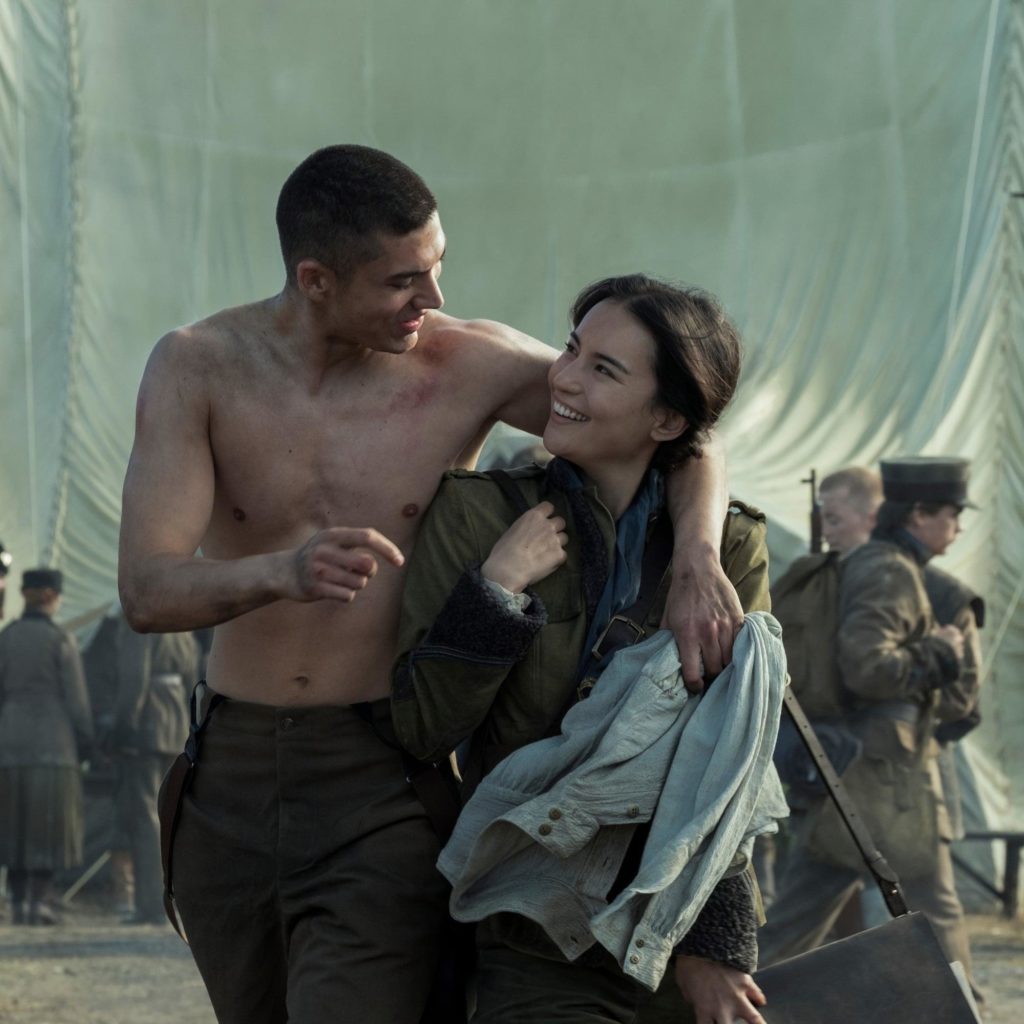
The trio of Crows is hilarious. I didn’t quite appreciate how funny Jesper was until later episodes. I guess I was just trying to follow along – a lot is happening in terms of plot and storyline, rhetoric, and wit. Jesper is perfect for humor and relatability, and his comedic timing is perfectly spot-on. He says he can’t imagine how someone would believe he’s so old from the forged paperwork that Kaz hands him. Soon after, he gets told that he looks even older than that by an inspector. Again, perfect punchline when Kaz says that he and the conductor are the same when observing a train. Of course next scene, the train goes on to explode right in front of them. “Too soon to appreciate the irony?” asks Jasper? “Yes, perhaps too soon”, he jests aloud to his friends.
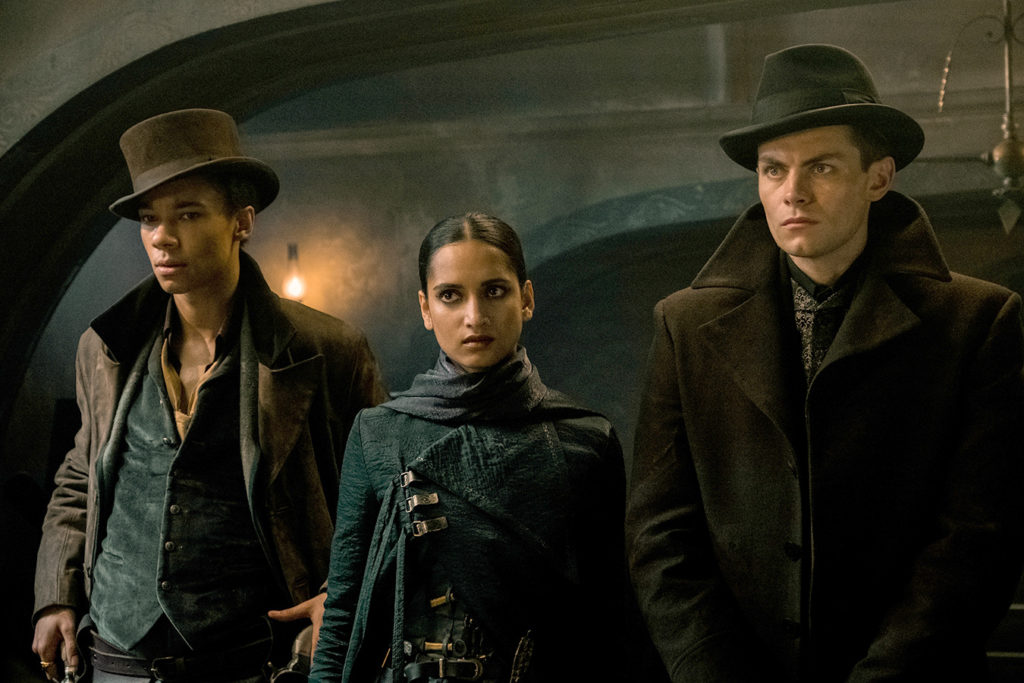
Inej and Kaz were so cute! Their romance inches along due to Kaz’s shy awkward feelings towards Inej. It’s so fluttery to see Kaz excel in resourcefulness and strategy, yet be so timid in romance. I LOVED Inej. She’s probably my favorite character, outside of Alina, other than Mal, and besides pre-evil Kirigan- ah it’s hard to pick. So many lovable characters! Inej was subtle in speech but powerful in presence and delivery. It really stood out to me that Netflix had Inej kill 2 white villains. This is rarely precedented in American films. Usually, the shows have the glamorous white protagonists killing brown and black villains left and right. I’m not saying that race should matter in terms of killing villains in film, but this situation does break the mold in terms of institutionalized race and hero patterns within the industry. Ideally, we can get to the point where there are enough people of color protagonists – to an equally proportional amount as white protagonists – where this doesn’t even matter. Such as whether a blue-eyed white guy kills a green-eyed white guy, or vice versa – again, in film of course. Not to speak so casually of villains and murderers outside of film.
Not a fan of this dynamic. Nina is too pushy in the romance with Matthias, especially since he’s the man who tortured her and repeatedly growls about hating her people. Take a hint girl! I was getting super stressed out by this dynamic – because it seemed not only desperate but also self-humiliating. Maybe Nina had Stockholm syndrome. Regardless, I didn’t find her character likable at all, or Matthias’s for that matter. Their storyline was too forced. I know the purpose was to show an example of how rival groups that despised each other were learning to overcome their prejudices, but still! Please choose a less cringe-worthy dynamic!
Shadow & Bone excels in natural story representation with powerful centering of culture. There’s a difference between forced awkward diversity – usually involving throwing POC into random pitiful 1-liner roles – and authentic and centered representation. Yes, race shouldn’t matter, but in this world – it realistically does. Exploring race, gender, orientation, and disability – in a positive and curious way – is important. Not talking about race makes it taboo and shameful. People don’t always realize the difference between the concepts of racist and racial. In any case, diverse identities are cool. Noting in an informal way as to how I and other viewers may view it (because oftentimes the identity of the character is reflected in the actor) – Alina is half Chinese half British; Mal is part British part Indian. Kirigan is White, part Jewish. The character Kaz has a handicapped leg and a limp. Amita Suman is Nepali, playing Inej – of an outsider Suli faith. Kit Young is of Scottish and Ugandan descent, playing Jesper who’s gay. Nina, who only meets the rest of the characters in the very last scene, is a white woman showing body-type diversity. Shadow and Bone was fantastic. It’s a big endeavor for me to get into a show since I have high standards for both good representation and a good story, but I thoroughly enjoyed Shadow and Bone. I can’t wait until season 2!
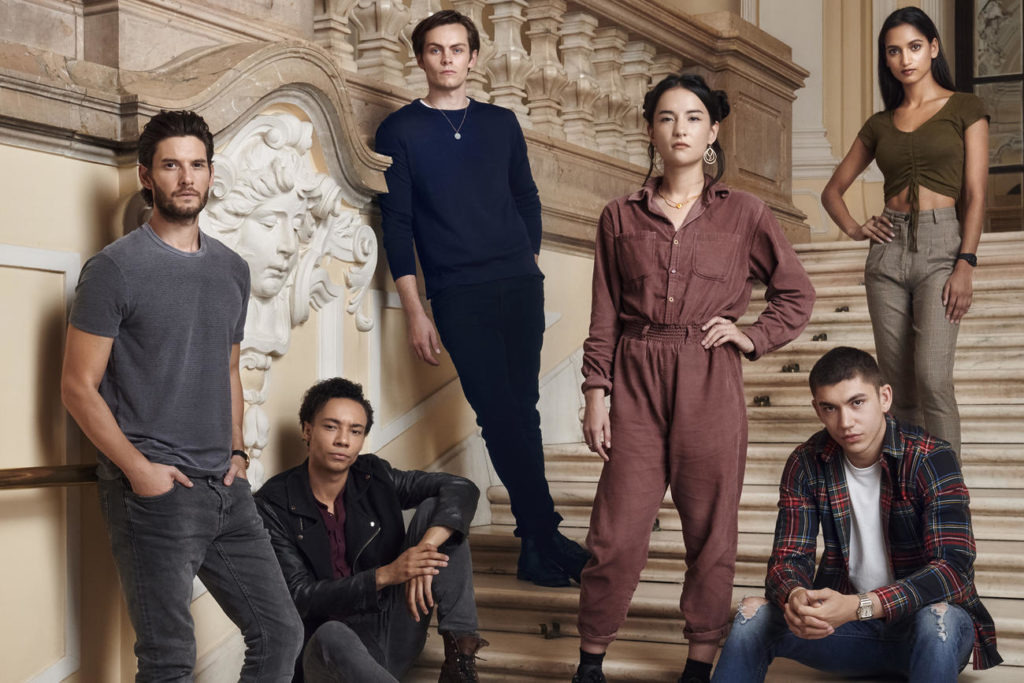
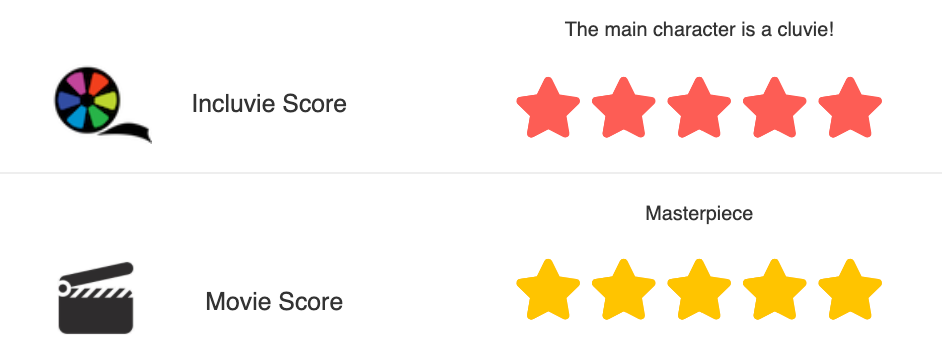
Related lists created by the same author
Crazy Rich Asians. The title is tacky, but the actual movie is both heartwarming and cosmopolitan. After all, it takes place in Singapore!